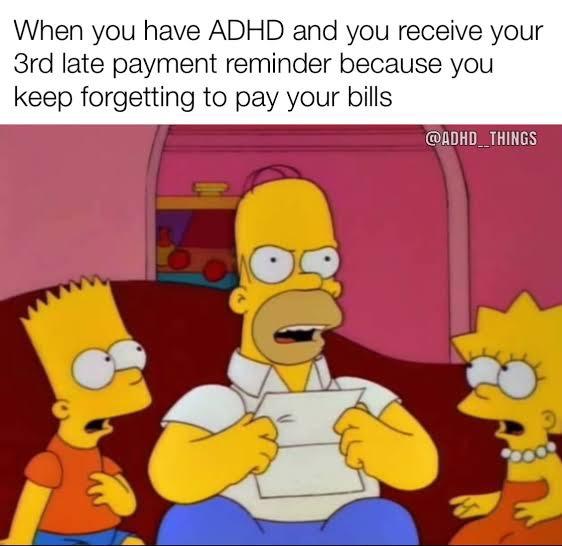What is the 'ADHD Tax'? Why does it cost £1,600 a year and strategies to help reduce it
A study by 'YouGov' discovered that those with ADHD suffered an additional cost of £1,600 per year vs the general population.

To the general population it might not be obvious that there is a link between good personal finance management and ADHD. Those that live with ADHD have long since realised that some of the symptoms that come with the condition are not a positive fit with good financial health. A study by 'YouGov' discovered that those with ADHD suffered an additional cost on average of £1,600 per year vs the general population. The complexity is that there is no magic bullet to solve the problem. Everyone with ADHD is different and it manifests for them in different ways, meaning that a solution to good financial management needs to be tailored to the individual.
Why do people with ADHD end up worse off financially?
- Executive Dysfunction: ADHD is characterised by executive dysfunction, which encompasses difficulties in attention regulation, impulse control, and organisation. This means individuals with ADHD often struggle with planning, prioritising tasks, and maintaining focus, leading to inefficiencies and increased effort to complete everyday activities.
- Time Blindness: People with ADHD frequently experience "time blindness," a concept where they struggle to accurately perceive the passage of time. This can result in difficulties with time management, punctuality, and estimating the time required for tasks, contributing to missed/late payments and poor monthly budget management.
- Hyper-fixation Traps: While ADHD is often associated with distractibility, individuals with ADHD can also experience hyper-focus – an intense concentration on a single task to the exclusion of everything else. While this might seem advantageous, it can lead to neglect of other responsibilities and difficulties in transitioning between tasks, ultimately consuming more time and energy. It can also lead to obsessions with new hobbies that are quickly forgotten after money has been invested in them.
- Impulsivity and Decision-Making: Impulsivity is a hallmark trait of ADHD, leading to impulsive decision-making and actions without considering long-term consequences. This makes living in the modern world of shiny consumerism and targeted advertising a nightmare when it comes to controlling spending impulses.

What are some of the most common reasons for the ADHD tax?
As I said at the beginning of the article, everyone is different. That being said, there are common themes that come up across the ADHD population. Here is a list of some of the most common ones that you might relate to:
- Fines and late fees: This one is very common and links to the time-blindness trait. Either totally forgetting or remembering too late that a bill is due or you need to return a book to the library might not seem like much in isolation but stretched out over a year / decades it totals a huge sum of money.
- Unplanned grocery shopping: If you go to the supermarket without a well written and thought through list you are giving into your impulses. Randomly grabbing items that look nice but might not even be interconnected when it comes to making a meal. This can add tonnes of money to a weekly shop bill.
- Forgetting to return unwanted items: It's pretty common to try before you finally buy in the world of internet shopping. The problem is when you forget to return the unwanted items within the allotted time period. It isn't uncommon for people with ADHD to end up with multiples of the same item laying around the house.
- Wasting unused food: The best intentions of filling the fridge with lovely fresh food, to save money on impulse takeaways is great but very often the food is forgotten and left to rot in the fridge. Loads of money can end up in the bin if there isn't a strict schedule and meal plan in place.
- Poor debt management: Not only are people with ADHD more likely to get into debt due to poor impulse control, but then managing that debt effectively becomes another admin tasks. Ensuring you are always on the lowest interest rate possible for your debts and keeping up with an overpayment schedule can be really challenging.
- Poor budget planning: Making a budget and and sticking to one are two different things. Very often there is an 'out of sight, out of mind' behaviour with ADHD. An example would be not being sure or forgetting when the bulk of bills come out and then spending before this date, only to be left with not enough money when the time comes.

Some simple strategies to support with money management and reduce the ADHD tax
There are ways to help curb these outcomes, but unfortunately it can require a lot more discipline vs the general population. The good news is once the systems have been set up, it will bring a feeling of control and ultimately be very motivating in the future once you see the impact on your finances. Here are 5 useful strategies:
- Budgeting and Financial Planning: Develop a comprehensive budgeting plan to track income and expenses, prioritise financial goals, and avoid impulsive spending. This is really crucial and should be checked regularly (preferably weekly) to make sure you are on track.
- Automate Finances: Set up automatic payments for bills, savings, and investments to reduce the mental gymnastics associated with managing finances and minimise the risk of missed payments or late fees.
- Seek Professional Assistance: Consider working with financial advisors or therapists who specialise in ADHD to develop tailored strategies for managing finances and coping with ADHD-related challenges.
- Build Emergency Savings: Establish an emergency fund to cover unexpected expenses or financial setbacks, providing a buffer against financial stress and reducing the need for impulsive borrowing or spending.
- Practice Delayed Gratification: Develop strategies to curb impulsive spending behaviours, such as implementing a "cooling-off" period before making significant purchases or seeking alternative ways to satisfy immediate desires without compromising long-term financial goals.